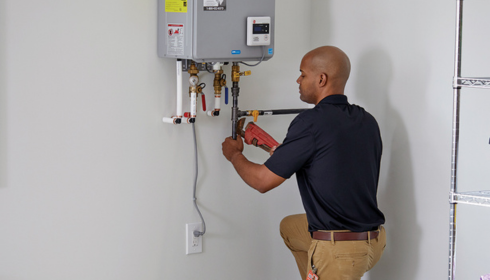There’s something oddly comforting about stepping into a hot shower on a cold morning. It’s one of those quiet luxuries we rarely think twice about — until one day, the water turns icy and suddenly you’re dancing under freezing water, questioning every life decision that led you there. It’s moments like that when you realize how much your comfort depends on something as simple (yet sophisticated) as your water heater.
A water heater isn’t glamorous. It’s not the star of your home. But it’s one of the hardest-working appliances you own, quietly running in the background, making life just a little more comfortable. Whether it’s for a hot bath, washing dishes, or doing laundry, that warm flow of water is a small miracle of engineering — one we only appreciate when it stops working.
Why Installation Isn’t Just Plug and Play
You’d think installing a water heater is just about connecting a few pipes and flipping a switch. But it’s not that simple. A proper water heater installation involves careful planning — everything from sizing to energy source, venting, and safety measures.
The difference between a quick fix and a proper installation shows up over time. Done right, it means steady water temperature, energy efficiency, and fewer breakdowns. Done poorly, and you’re looking at leaks, high utility bills, or even safety risks.
Professionals know how to account for things like water pressure, local codes, and insulation. They make sure your heater is not just functional, but optimized. Because, honestly, a reliable hot water supply isn’t something you want to gamble with.
The Rise of Tankless Systems
Traditional water heaters do one job: store hot water until you need it. But technology has moved fast, and now we have something smarter — tankless water heaters. They don’t store water at all. Instead, they heat it on demand.
Imagine never running out of hot water, no matter how long your shower lasts. That’s the promise of tankless systems. They’re energy-efficient, compact, and often last longer than traditional models. You don’t have to worry about the tank rusting or constantly reheating water you’re not using.
But they’re not perfect. They can be more expensive upfront and may require an electrical upgrade or higher gas capacity, depending on your home’s setup. Still, for many homeowners, the trade-off is worth it — especially for those who value both comfort and efficiency.
Tankless systems are a glimpse of how modern homes are evolving — smarter, leaner, and more sustainable.
The Steady Workhorse: Gas Water Heaters
Not everyone’s ready to switch to tankless systems, and that’s perfectly fine. There’s a reason gas water heaters have stood the test of time. They’re reliable, powerful, and often heat water faster than electric models.
They work by using a gas burner located beneath the tank, heating the water from below and maintaining it at a consistent temperature. The result? Hot water that’s ready whenever you are.
Gas heaters are especially handy in areas where power outages are common — because when the electricity goes out, you still have hot water. That reliability is why so many homeowners stick with them. But they do need regular maintenance, especially to prevent sediment buildup that can reduce efficiency and shorten their lifespan.
When the Water Turns Lukewarm (or Worse)
If you’ve ever been mid-shower and felt the temperature drop suddenly, you know that sinking feeling. It’s the universal sign that your heater’s struggling. But before you panic, know that it’s often fixable — and sometimes not as dramatic as it seems.
It could be something small, like a faulty thermostat, mineral buildup, or an aging heating element. Or maybe your tank is simply undersized for your household’s needs. Either way, a professional plumber can diagnose it quickly.
Ignoring the problem, though, can make things worse. A struggling water heater isn’t just inconvenient — it’s often wasting energy while delivering less performance.
Signs You Might Need an Upgrade
Water heaters don’t last forever. Most traditional ones give you around 8–12 years of service before calling it quits. Here’s how you know it might be time to consider an upgrade:
- You’re running out of hot water faster than before.
- There’s rust-colored water coming from your taps.
- You hear popping or rumbling noises from the tank.
- Your energy bills keep creeping up.
If any of these sound familiar, it’s worth getting your system checked. Upgrading to a newer model — whether it’s gas, electric, or tankless — can save money in the long run while giving you a more consistent hot water supply.
The Energy Factor
Water heating accounts for nearly 20% of your home’s energy use. That’s huge. Choosing the right type of system and maintaining it properly can make a noticeable difference in your bills and your carbon footprint.
Tankless systems use less energy because they heat water only when needed. Gas models are more efficient than older electric tanks, but they require proper ventilation and maintenance. Whichever you choose, efficiency comes down to correct installation, regular servicing, and understanding how much hot water your household actually uses.
You’d be surprised how often people install systems that are either too big or too small for their needs — both of which lead to waste and frustration.
The Little Things That Extend Lifespan
Here’s a secret: a few simple habits can add years to your water heater’s life.
- Flush the tank yearly to remove sediment buildup.
- Check the anode rod — it prevents corrosion inside the tank.
- Insulate pipes to maintain water temperature and reduce energy loss.
- Schedule regular maintenance even if nothing seems wrong.
It’s like going to the doctor for a check-up — catching problems early always costs less than waiting for a breakdown.
Making the Choice That Fits Your Life
There’s no one-size-fits-all answer to the “best” water heater. It depends on your home, your budget, and your lifestyle.
If you have a large family that showers back-to-back every morning, a high-capacity tank or gas model might make sense. If you live alone or value efficiency and long-term savings, a tankless system could be ideal.
The key is balance — finding a system that fits your daily routine without wasting energy or water.
A Final Thought
It’s easy to overlook the role your water heater plays in daily life — until the day it fails. But think about it: that morning coffee, that evening shower, those piles of laundry — they all depend on that quiet, unassuming appliance working exactly as it should.

